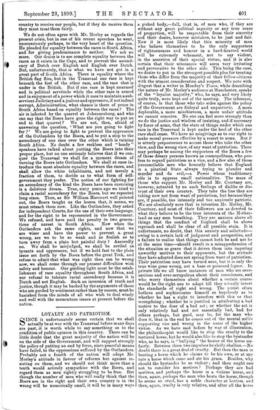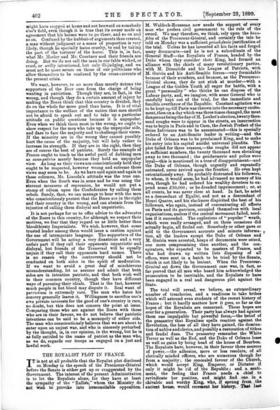LOYALTY. AND PATRIOTISM.
SINCE it unfortunately seems certain that we shall actually be at war with the Transvaal before many days are past, it is worth while to say something as to the condition of public opinion in this country. There can be little doubt that the great majority of the nation will be on the side of the Government, and will support strongly the policy of putting an end by force, since peaceful means have failed, to the oppressions suffered by the Outlanders. Probably not a fourth of the nation will adopt Mr. Morley's attitude in favour of reforms but against in- sisting on them, and we should not think more than a tenth would actively sympathise with the Boers, and regard them as men rightly struggling to be free. But though the number of men who will really think that the Boers-are in the right and their own country is in the wrong will be numerically small, it will be in many ways SINCE it unfortunately seems certain that we shall actually be at war with the Transvaal before many days are past, it is worth while to say something as to the condition of public opinion in this country. There can be little doubt that the great majority of the nation will be on the side of the Government, and will support strongly the policy of putting an end by force, since peaceful means have failed, to the oppressions suffered by the Outlanders. Probably not a fourth of the nation will adopt Mr. Morley's attitude in favour of reforms but against in- sisting on them, and we should not think more than a tenth would actively sympathise with the Boers, and regard them as men rightly struggling to be free. But though the number of men who will really think that the Boers-are in the right and their own country is in the wrong will be numerically small, it will be in many ways a picked body,—full, that is, of men who, if they are without any great political sagacity or any true sense of proportion, will be respectable from their sincerity and their desire, however mistaken, to be just and fair. Now it is most likely that this minority of men who believe themselves to be the only supporters of righteousness and honour in a hard-hearted world will be extremely vehement, not to say violent, in the assertion of their special virtue, and it is also certain that their utterances will seem very irritating and provocative to the other side. This being the case, we desire to put in the strongest possible plea for treating those who differ from the majority of their fellow-citizens with the utmost consideration and respect. We note with disgust that a writer in Monday's Times, while describing the nature of Mr. Morley's audience at Manchester, speaks of the " loyalist majority," who, he says, and very likely quite truly, were kept out of the meeting. The inference, of course, is that those who take sides against the policy of the Government are disloyal and unpatriotic. A more deplorable, a more mischievous, a more unfair attitude we cannot conceive. No one can feel more strongly than we do the justice and wisdom of insisting, and if necessary by force of arms, that the state of things under which one race in the Transvaal is kept under the heel of the other race shall cease. We have no misgivings as to our right to make moral pressure effective by a resort to arms. But if is utterly preposterous to accuse those who take the other view, and the wrong view, of any want of patriotism. There may perhaps be among the supporters of the Boers a few of those dreary persons known as cosmopolitans, who pro- fess to regard patriotism as a vice, and a few also of those irreconcilable men who honestly believe that England is a piratical State always trying to plunder and murder and do evil,—a Power whose traditionary role is to oppress small nationalities. The mass of those who support Mr. Morley and Mr. Courtney are, however, actuated by no such feelings of dislike or dis- trust of their own country. They take the line they are taking now not from want of patriotism, but because they are, if possible, too intensely and too anxiously patriotic. We are absolutely sure that in intention Mr. Morley, Mr. Courtney; and most of their followers are as devoted to what they believe to be the true interests of the Mother- land as any men breathing. They are anxious above all things that the conduct of England shall be above reproach and shall be clear of all possible stain. It is unfortunate, no doubt, that this anxiety and solicitude— owing to a certain lack of judgment and perspective, and a failure to realise that things cannot both be and not be at the same time—should result in a misapprehension of the situation so grave that it drives them into imputing unworthy motives to their opponents, but the attitude they have adopted does not spring from want of patriotism. Their patriotism may have turned sour, but it is only the true wine gone wrong, not a base or poisoned liquor., In private life we all know instances of men who are over- anxious and over-scrupulous about their consciences, and who worry themselves about whether a certain course would be the right one to adopt till they actually invert the standards of right and wrong. The purist often bothers and sophisticates himself so hopelessly as to whether he has a right to interfere with this or that wrongdoing ; whether he is justified in attributing a bad motive to the doer of a bad act ; or whether the act is only relatively bad and not essentially bad, bad for others perhaps, but good, may be, for the man who does it, that in the end he comes out of the mental melee supporting vice and wrong in the name of the higher virtue. As we have said before by way of illustration, the philanthropist would like to stop the cruelty to the tortured horse, but he would also like to stop the bystander who, as he says, is " bullying " the beater of the horse un- fairly. Between these two impulses he shilly-shallies.—No doubt there is a great deal of cruelty. But then the man is beating a horse which he claims to be his own, or at any rate a horse which came and ate his grass. Besides, why should the bystander be so violent ; and then ought one not to consider his motives ? Perhaps they are bad motives, and perhaps the horse is a vicious horse, and then, again, perhaps the man who beats the horse, though he seems so cruel, has a noble character at bottom, and then, again, cruelty is only relative, and after all the horse might have stopped at home and not browsed on somebody else's field, even though it is true that its owner made an agreement that his horses were to go there, and so on and so on. Confused by the hubbub of arguments thus created, a man without judgment or a sense of proportion is very likely, though he specially hates cruelty, to end by taking the part of the torturer of the horse. This is, in fact, what Mr. Morley and Mr. Courtney and their friends are doing. But we do not call the man in our fable wicked, or cruel, or evilly intentioned, but only ill-judging, and we must not be more severe on those of our politicians who allow themselves to be confused by the cross-currents of the present crisis.
We want, however, to ao more than merely detena the supporters of the Boer case from the charge of being wanting in patriotism. Though they are, in fact, in the wrong, and though they do a certain amount of injury by making the Boers think that this country is divided, they do on the whole far more good than harm. It is of vital importance to the welfare of the nation that men should not be afraid to speak out and to take up a particular attitude on public questions because it is unpopular. Even when we think them most in the wrong, we ought to show respect for the men who take up the unpopular side, and dare to face the majority and to challenge their views. If the minority are in the wrong they cannot possibly hurt the cause of the majority, but will help rather to increase its strength. If they are in the right, then they are of course the best of patriots. Surely the example of France ought to teach us the awful peril of dubbing men as sans-parries merely because they hold an unpopular view. As long as their views are conscientiously held they ought to be respected, however wrong and extreme those views may seem to be. As we have said again and again in these columns, Mr. Lincoln's attitude was the true one. Even when the South was in arms and he was using the sternest measures of repression, he would not put a stamp of odium upon the Confederates by calling them rebels. Surely, then, we can manage to bear with the men who conscientiously protest that the Boers are in the right and their country in the wrong, and can abstain from the injustice of calling them disloyal and unpatriotic.
It is not perhaps for us to offer advice to the advocates of the Boers in this country, for although we respect their motives, we fear that they regard us as little better than bloodthirsty Imperialists. We wish, however, that some trusted leader among them would issue a caution against the use of intemperate language. The supporters of the Government will be acting a very disastrous and a very unfair part if they call their opponents unpatriotic and disloyal, but friends of the Transvaal will be equally unjust if they call their opponents hard names. There is no reason why the controversy should not be conducted on both sides in the spirit of moderation. If we want to avoid a great deal of mischievous misunderstanding, let us assume and admit that both sides are in intention patriotic, and that both wish well to their common country, though they have different ways of pursuing their ideals. That is the fact, however much people in hot blood may dispute it. Real want of patriotism is extremely rare. The man who hates his country generally leaves it. Willingness to sacrifice one's own private interests for the good of one's country is rare, no doubt, but this does not concern the point at issue. Comparing those who are against the Boers with those who are in their favour, we do not believe that patriotic intentions can be said to be a monopoly of either side. The man who conscientiously believes that we are about to enter upon an unjust war, and who is sincerely perturbed by the thought, is, in our opinion, in the wrong, but he is as fully entitled to the name of patriot as the man who, as we do, regards our troops as engaged on a just and lawful work.



































 Previous page
Previous page